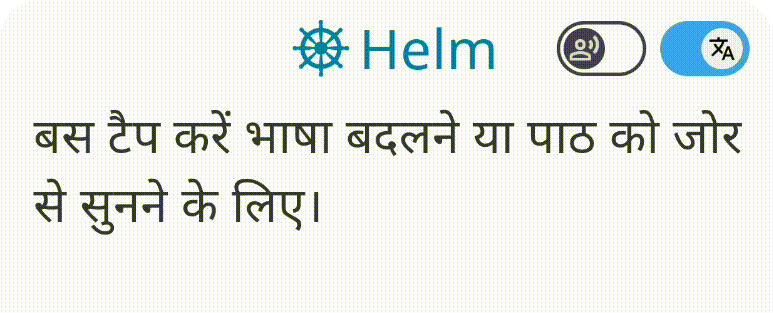ताज़ा और वास्तविक सामग्री के साथ स्वाभाविक रूप से भाषाएँ सीखें!

लोकप्रिय विषय
क्षेत्र के अनुसार खोजें
 दिव्यांगजन सशक्तिकरण विभाग के सचिव राजेश अग्रवाल के अनुसार, भारत का लक्ष्य प्रतिस्पर्धी लागत और "मेक इन इंडिया" जैसी सहायक नीतियों के माध्यम से सहायक उपकरण विनिर्माण का वैश्विक केंद्र बनना है।
दिव्यांगजन सशक्तिकरण विभाग के सचिव राजेश अग्रवाल के अनुसार, भारत का लक्ष्य प्रतिस्पर्धी लागत और "मेक इन इंडिया" जैसी सहायक नीतियों के माध्यम से सहायक उपकरण विनिर्माण का वैश्विक केंद्र बनना है।
 दिव्यांगजन सशक्तिकरण विभाग के सचिव राजेश अग्रवाल के अनुसार, प्रतिस्पर्धी विनिर्माण लागत और 'मेक इन इंडिया' जैसी सहायक नीतियों के कारण भारत सहायक उपकरणों के लिए एक प्रमुख विनिर्माण केंद्र बनने के लिए तैयार है, जिससे वैश्विक बाजार में इसकी वृद्धि को बढ़ावा मिलेगा।
दिव्यांगजन सशक्तिकरण विभाग के सचिव राजेश अग्रवाल के अनुसार, प्रतिस्पर्धी विनिर्माण लागत और 'मेक इन इंडिया' जैसी सहायक नीतियों के कारण भारत सहायक उपकरणों के लिए एक प्रमुख विनिर्माण केंद्र बनने के लिए तैयार है, जिससे वैश्विक बाजार में इसकी वृद्धि को बढ़ावा मिलेगा।  अग्रवाल ने विकलांग लोगों को कोटा के बजाय निर्दिष्ट नौकरी प्रोफाइल के माध्यम से कार्यबल में शामिल करने की आवश्यकता पर बल दिया, तथा उनकी आवश्यकताओं के अनुरूप सुलभ बुनियादी ढांचे, अधिक रोजगार के अवसरों और उन्नत शैक्षिक उपकरणों की मांग की।
अग्रवाल ने विकलांग लोगों को कोटा के बजाय निर्दिष्ट नौकरी प्रोफाइल के माध्यम से कार्यबल में शामिल करने की आवश्यकता पर बल दिया, तथा उनकी आवश्यकताओं के अनुरूप सुलभ बुनियादी ढांचे, अधिक रोजगार के अवसरों और उन्नत शैक्षिक उपकरणों की मांग की।  नई दिल्ली में विकलांग व्यक्तियों के सशक्तिकरण पर आयोजित छठे एसोचैम सम्मेलन का उद्देश्य 'विकसित भारत' दृष्टिकोण के अनुरूप भारत को सहायक प्रौद्योगिकी के वैश्विक केंद्र के रूप में स्थापित करना था।
नई दिल्ली में विकलांग व्यक्तियों के सशक्तिकरण पर आयोजित छठे एसोचैम सम्मेलन का उद्देश्य 'विकसित भारत' दृष्टिकोण के अनुरूप भारत को सहायक प्रौद्योगिकी के वैश्विक केंद्र के रूप में स्थापित करना था।
 India aims to become a global hub for assistive device manufacturing, driven by competitive costs and supportive policies like "Make in India", according to Rajesh Aggarwal, Secretary of the Department of Empowerment of Persons with Disabilities.
India aims to become a global hub for assistive device manufacturing, driven by competitive costs and supportive policies like "Make in India", according to Rajesh Aggarwal, Secretary of the Department of Empowerment of Persons with Disabilities.